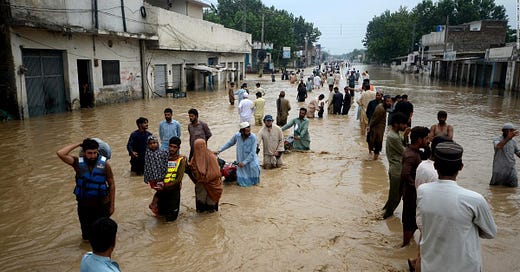Pakistan's Floods Beggar the Imagination
Rainfall is at 780% of "normal," whatever that still means--Aid needed!
I could—and probably I should—write a column every single day about the effects of the climate crisis now playing out daily around the world. But there’s some balance that must be stuck between chronicling the ongoing horror, and becoming inured to it. Most of the time, it’s more important to figure out how the hell we’re going to slow the train down.
But sometimes—well, check out these video images coming in from Pakistan, where one of the truly awful tragedies of the greenhouse era is playing out.

The numbers—a thousand dead, 33 million affected—don’t mean that much (and are doubtless underestimates; it will take weeks to reach every corner of the remote northwest frontier where some of the worst damage is reported). But just try and imagine the number of lives turned upside down.
"The house which we built with years of hard work started sinking in front of our eyes," Junaid Khan, 23, told the AFP news agency. "We sat on the side of the road and watched our dream house sinking."
Or
"She told me: 'Daddy, I'm going to collect leaves for my goat,'" Muhammad Fareed, who lives in the Kaghan Valley in the northern Khyber Pakhtunkhwa province, said.
"She went to the bank of the river and a gush of water followed and took her away."
There’s no doubt that this is what happens when you heat an atmosphere: warm air holds more water vapor than cold; in Sindh province, where some of the worst flooding is taking place, rainfall is nearly five times the average. Sherry Rehman, Pakistan’s climate change minister, called the flooding a “climate-induced humanitarian disaster” of “epic proportions.” According to Bloomberg,
Millions of acres of farmland, including part of the prized cotton crop, have been destroyed in a country where the agricultural sector accounts for about a quarter of the economy.
And there’s no doubt that the people of Pakistan are not to blame for their tragedy: on average each Pakistani is responsible for about one fifteenth as much carbon dioxide as each American, and even that is fairly recent; over the whole span of the fossil fuel era, America has produced a quarter of the earth’s greenhouse gases; Pakistan, with about 220 million people, produces about one half of one percent of the world’s emissions. And yet, before the flooding, they suffered through a savage springtime heatwave; urban temperates reached 121 Fahrenheit, in a place where, as of 2018, there were fewer than a million air conditioners.
So, help, if you can.
The Red Crescent Society is at work—details here
So is the World Food Programme—details here
Other news from around the world of climate and energy
+A great profile of a 72-year-old climate activist from Oregon, making precisely the point we’ve been finding resonates so sharply at Third Act
I look back historically at social movements and individual acts of strength, like efforts around slavery, child labor and marriage equality, and what people have done to overcome oppression. I feel strengthened by their ability to persist and to know change can happen.
(I feel a particular bond here, because Bonnie McKinlay was also arrested on day 1 of the Keystone XL demonstrations in 2011)
+The unflagging activist Clara Vondrich celebrates Global Petroleum Day with an essay pointing out
Unless we put the brakes on the production and export of oil and gas at home, our investments in renewable energy will do little to change the course of climate history. Of the 11 million barrels of oil per day that were produced domestically in 2021, over 8.5 million barrels per day were exported. The Inflation Reduction Act only counts the barrels burned at home towards its targets, giving the fossil fuel industry a free pass to dump its trash in someone else's backyard.
+David Wallace-Wells, on the smell of smoke that is the new signature scent of the American West
Ten years ago, Californians often feared fire, even as they lived in some uneasy accommodation to it. Now, increasingly, they fear smoke — each pyrocumulus cloud or fire tornado an airborne toxic event expanding outward from the flames. Ten years ago, coastal residents might have taken comfort in the hundreds of miles between the inland fires and their homes; now they wonder about wind patterns that might bring the particle pollution to their doors.





Thank you, Bill for keeping Pakistan in our thoughts. Sometimes it seems as though denial and apathy is increasing with the increasingly horrific manifestations of the climate crisis. I truly do not understand how terrible a global situation has to become before action is taken. I had hoped Covid would awaken the world to the need for immediate and bold action when faced with a force of nature, but no...The theory of evolution failed to account for our immense capacity fo self-delusion and self-destruction as a species.
We have the ability to transition to clean energy so much quicker but politics are in the way. The need is urgent but now inflation has become the excuse for delay and also the monetary investment. Don't our elected officials realize postponing acting on climate will multiply the cost and cost lives. We will be paying for more climate disasters.